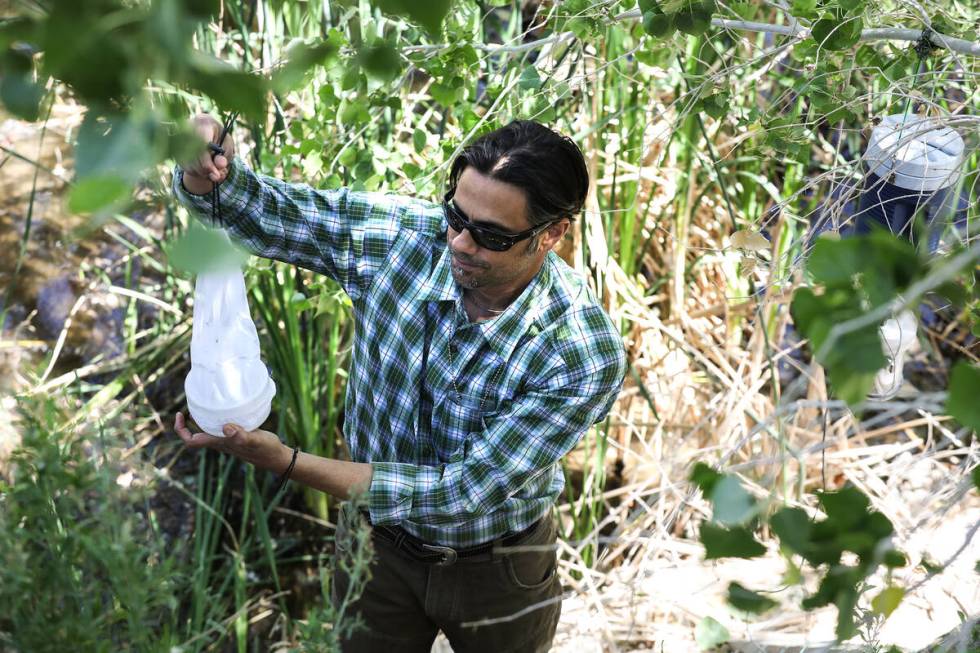The buzz: Mosquito season could be early, active

After three years of negligible mosquito-borne disease in Southern Nevada, officials on Thursday warned of a possible early and active mosquito season accompanied by a spike in cases of West Nile virus.
“West Nile has proven to be very unpredictable,” said Vivek Raman, environmental health supervisor with the Southern Nevada Health District. “Typically after a few quiet years of no, or very little, activity, you can start to see a spike.”
During the pandemic, even mosquitoes seemed to be lying low. During all of 2020, 2021 and 2022, there was only one case of West Nile virus — a mild one — recorded in Clark County, according to health district data. In contrast, the district declared an outbreak of the virus in 2019, when 43 cases were recorded in Clark County, including 34 more severe cases affecting the central nervous system and one death.
A combination of factors, including the cyclical nature of the disease and the wet spring weather, points to the possibility of a spike this mosquito season, which typically starts in the summer and continues through fall, officials said.
The warning came as officials launched the start of annual mosquito surveillance, encouraging residents to “fight the bite” by supporting mosquito-prevention efforts during a media briefing at Clark County Wetlands Park in the southeast valley.
Birds to mosquitoes to humans
Wet weather can lead to pockets of stagnant water that promote mosquito breeding, said officials, who encouraged residents to eliminate stagnant water from their yards, ponds or pools.
Additionally, the wet weather can lead to an influx of migratory birds, some of which may carry the West Nile virus from another region, Raman said in an interview following the briefing.
“There’s a lot of vegetation, a lot of nice nesting and roosting habitat” to attract the birds, he said.
Birds are key to transmission of mosquito-borne illnesses. Humans can become infected with the virus when bitten by a mosquito that has bitten an infected bird.
Raman said that the health district tested 43,000 mosquitoes last year and found none with West Nile virus.
Because birds in Southern Nevada have not been exposed to West Nile virus in recent years, they may be more susceptible to infection, which also contributes to the potential for a spike, Raman said.
Unlike in parts of Arizona, West Nile virus is not endemic or consistently found in Southern Nevada, Crystal Hepp, an associate director with The Translational Genomic Research Institute in Flaggstaff, Arizona, said in a phone interview. Hepp studies West Nile virus.
Signs and symptoms
Most people with West Nile virus don’t feel sick. About one in five who are infected develop a fever with symptoms such as headache, body aches, join pain, vomiting, diarrhea or rash, according to the Centers for Disease Control and Prevention. Most recover, but fatigue and weakness can last for weeks or months.
About one in 150 infected people develop a severe illness affecting the central nervous system such as encephalitis (inflammation of the brain) or meningitis (inflammation of the membranes that surround the brain and spinal cord). One in 10 who develop severe illness die.
Mosquitoes can carry other diseases, as well. Southern Nevada is seeing increasing numbers of the aedes aegypti mosquitoes, which can spread viruses such as Zika and dengue, Hepp and Raman said. The Zika virus is associated with a birth defect called microcephaly, which can affect babies born to women who become infected while pregnant.
Mosquitoes carrying the Zika or dengue virus have not been found in Southern Nevada.
Mosquitoes with the dengue virus — which can cause fever, aches and pains, or a rash — have been found in Phoenix’s Maricopa County, and a case has been identified in a person thought to have acquired it from a mosquito there.
“Aedes aegypti is very much a backyard breeding mosquito,” Raman said. “And it’s the kind of mosquito that bites people in the daytime and around the ankles, and they’re very aggressive.
“And so, that’s why it’s so important for backyard breeding prevention.”
‘Fight the bite’
The health district and Clark County’s vector control division have partnered for decades to prevent mosquito-borne illness, officials said. They set traps to survey numbers of mosquitoes as well as their type and whether they’re infected.
During mosquito season, the health district sets 50 to 60 traps per day in parks, wash channels, wetland areas and other potential breeding sites.
Officials encouraged residents to report mosquito activity to the health district surveillance program at 702-759-1633.
To report a green pool — a breeding ground for mosquitoes — residents can call the code enforcement agency for their city or the unincorporated county.
Clark County drained 250 green pools last year, spokesman Erik Pappa said.
Authorities also encourage people to use mosquito repellent and — a tough order during a Southern Nevada summer — to wear long pants and long sleeves while outdoors.
Contact Mary Hynes at mhynes@reviewjournal.com or 702-383-0336. Follow @MaryHynes1 on Twitter.